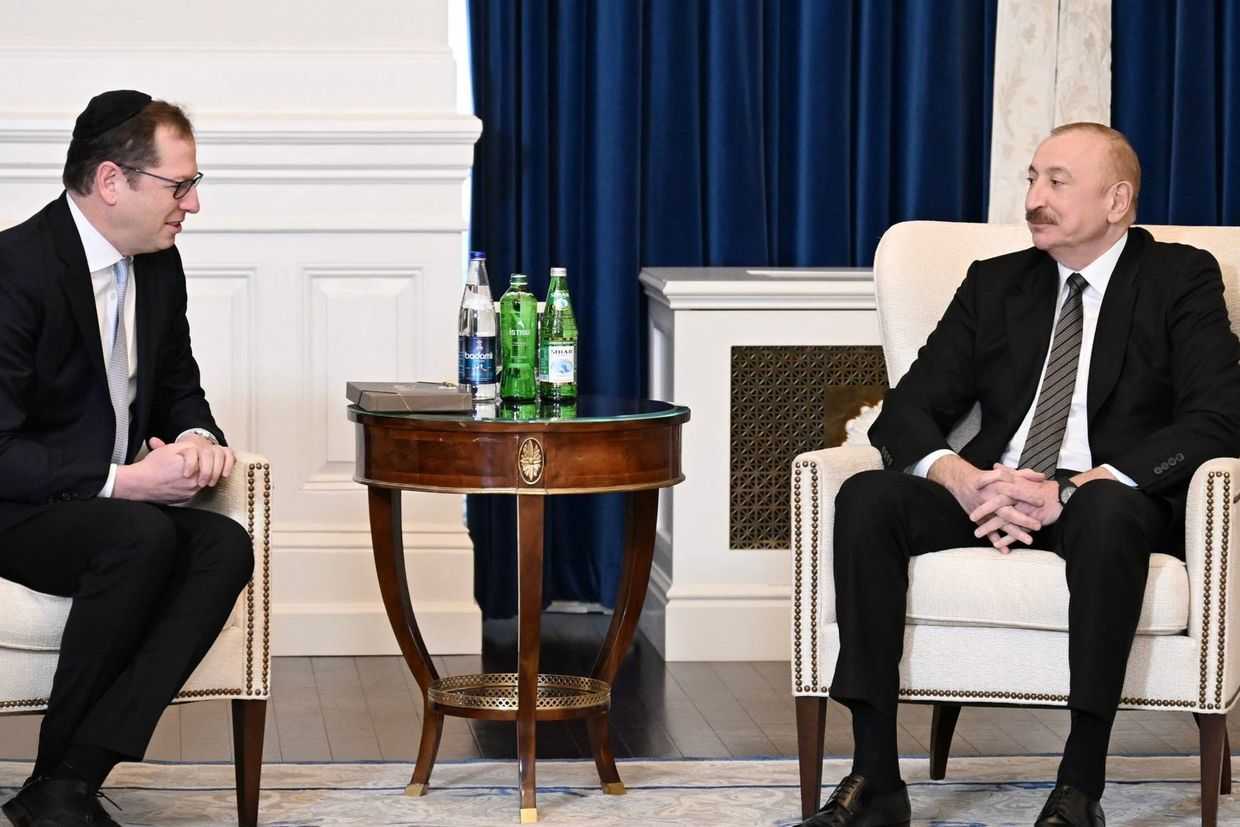
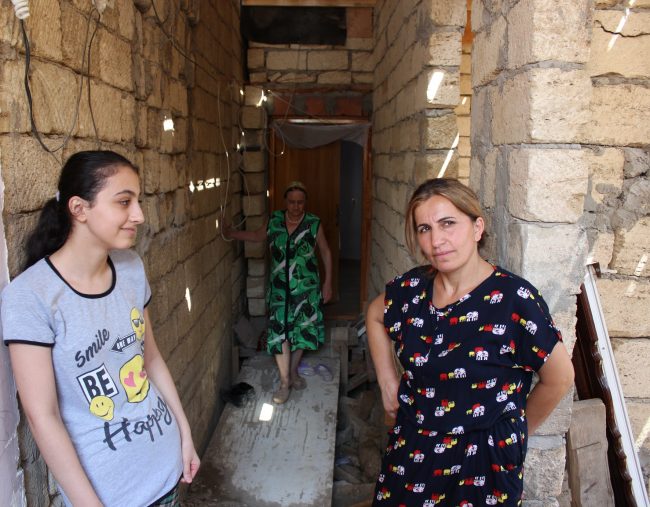
 The Nagorno-Karabakh war left thousands in Azerbaijan with lasting scars — both physical and psychological. For many of the loved ones of disabled veterans, being a carer is a full-time task. But carers say they receive little support, and they must get by on the small disability benefits available.
The Nagorno-Karabakh war left thousands in Azerbaijan with lasting scars — both physical and psychological. For many of the loved ones of disabled veterans, being a carer is a full-time task. But carers say they receive little support, and they must get by on the small disability benefits available.
‘I used to be a nurse in a military hospital. I witnessed many things there, like girls abandoning their grooms whose hands or arms had been amputated. All the young men were participants in the Karabakh War. When I got married, [my husband] was missing a part of his leg. We first met in the hospital. Now we’ve been married for 21 years. This year, I gave him one of my kidneys’, Bahriyya Gubadova, 48, tells OC Media.
Bahriyya married Aghamali Bakhshaliyev in 1997 and the couple now have three sons. Aghamali became disabled during the Nagorno-Karabakh War, while serving in the Fuzuli District from 1992–1994. Most of the area is today under Armenian control and the population has been displaced.
‘They say that sappers [de-miners] make mistakes only once. It’s because of my first and last mistake that I lost my left leg below the knee. When I went to explore the village of Alkhanli in Fuzuli [District], I stepped on a mine. Even though I’d neutralised over 900 anti-tank and 58 anti-personnel mines over the previous two years, I lost my leg because of my own mistake’, says Aghamali.
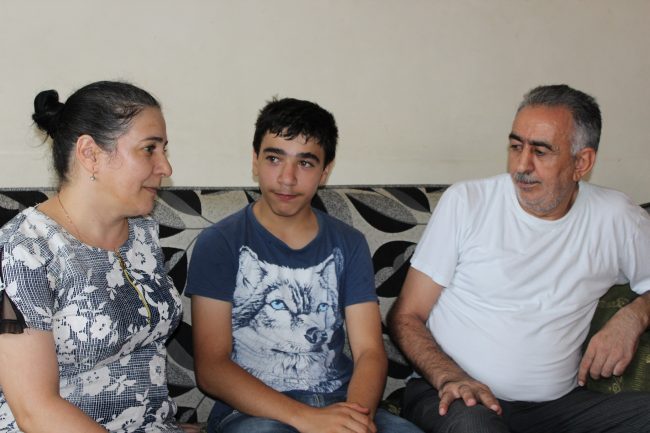
‘In 2006, I had to quit my job’, Bahriyya tells OC Media. ‘The children were small and I had to take care of my husband. Since the day we were married, we were not like other couples who could go out and have a good time. We became prisoners in our home’.
When both of Aghamali’s kidneys stopped working early this year, Bahriyya agreed to give him one of hers. The operation was a success, but she doesn’t consider it an act of heroism.
‘When I married him, I knew the condition he was in. My husband is my responsibility and it’s my duty to look after him. Still today, I have never once said “I’m tired”’, says Bahriyya.
Aghamali worked for a while after the war, but is now unemployed. As a war veteran, he receives disability benefits of ₼481 ($280) per month and a presidential pension of ₼182 ($110). His kidney transplant was paid for by the state, and before that, the state also provided him with a flat and a car.
Fazil Talibov, a spokesperson for the Ministry of Labour and Social Protection, tells OC Media that as of July, the fight to protect Azerbaijan’s ‘territorial integrity, independence, and constitutional structure’ had left almost 15,000 people disabled.
The need for a carer
Bahruz Jamalov is 56 years old. In 1992, the car he was driving hit a landmine, costing him both his legs. The war also claimed the lives of his brother and two cousins; another cousin is still missing. As a disabled war veteran, he receives the same benefits as Aghamali.
In 1991, Bahruz married Konul Jamalova, and they now have three children. He lost his legs a year after their wedding. ‘Since that day, I’ve had to look after Bahruz. This is our fate. It’s difficult, but I’ve accepted the reality’, Konul says.
Konul is unemployed, and because her husband is unable to work, she says the family lives on his benefits.
‘It’s true that we haven’t applied anywhere’, Konul tells OC Media, ‘but Bahruz doesn’t like going from office to office either.’
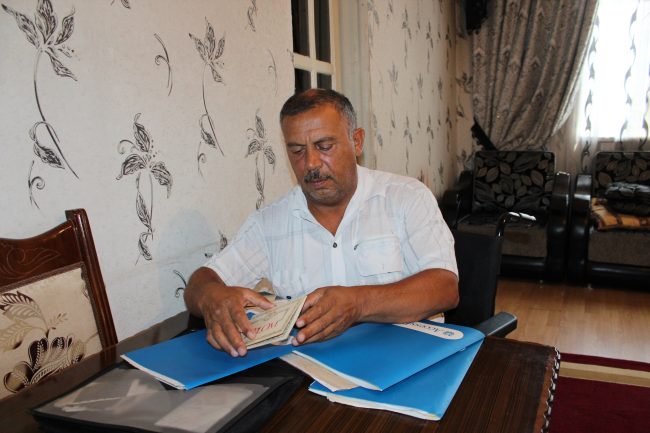
‘In 2001, people who became disabled in the Karabakh War held a large protest in Baku’, Konul says. ‘Some of them were beaten and others arrested. This attitude towards people with disabilities affected Bahruz very much. At that time, their demands were social — raising benefits, receiving cars and wheelchairs, and so on. Nobody asked about these things for us until now. For a wheelchair, he had to visit Aghdam District 20 times over two years’.
‘It wouldn’t be so bad if I had also been granted benefits. The severe disability pamphlet states “there is a need for a carer”. If I weren’t there, who would come and take care of Bahruz?’, asks Konul.
‘Relevant measures’
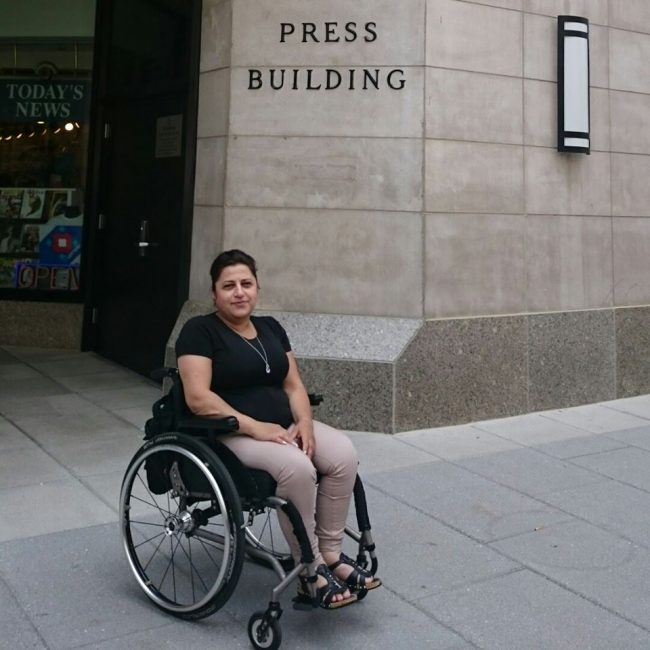
Sevda Safaraliyeva, an expert being consulted on a voluntary basis by parliament’s Social Policy Committee who has a disability herself, tells OC Media she and others with severe disabilities appealed several times to the president, parliament, and the Ministry of Labour to solve the many problems facing people with severe disabilities.
‘The appeal touched upon the issue of benefits for carers of people with severe disabilities’, Sevda says.
‘At the level of parliament and the ministry, the problem was expressed only verbally, and they noted that it was not possible to provide these allowances due to financial limitations’, says Safaraliyeva.
Firudin Mammadov, the head of public union the People with Disabilities from the Homeland War, himself a Nagorno-Karabakh War veteran with a severe disability, says that only those caring for people with a severe disability receive any remuneration — ₼11–12 ($7) per month from their disability benefits is allocated for carers.
‘Of course, the amount is very small. Many years ago, in a meeting with the former Minister of Labour and Social Protection, we suggested benefits of ₼300 ($180) for carers of disabled Karabakh War veterans. We gave the Ministry a list of 300 individuals in serious condition whose carers should be paid. But the currency devaluation and the fall in oil prices put an end to the feasibility of this plan. Now the price of oil is increasing, and we hope the issue will be resolved’, Mammadov tells OC Media.
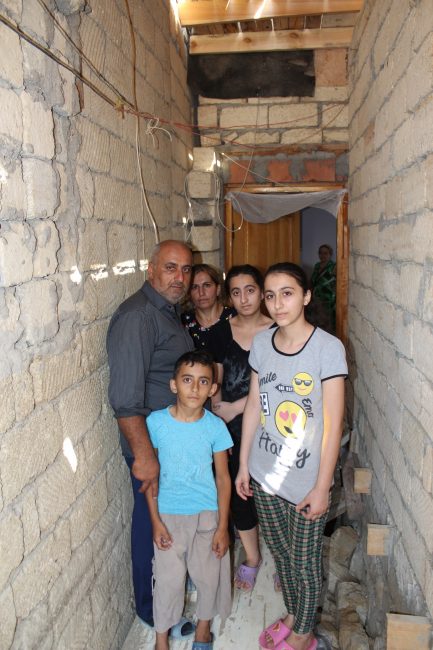
Fazil Talibov, a spokesperson for the Ministry of Labour and Social Protection, tells OC Media that in addition to disability benefits, caring for a person with a severe disability counts as work and entitles carers to state insurance.
‘The education expenses of their children studying on a paid basis in higher educational institutions of our republic are also paid at the expense of the state budget’, he says.
Talibov says that ‘relevant measures’ are being taken to ensure people with disabilities receive proper treatment and rehabilitation at the state’s expense.
‘We can’t afford to treat him’
Turaj Jafarova is worried about the psychological condition of her husband, Vagif Abbasov, who fought in the Nagorno-Karabakh War.
‘Vagif fought in 1993 in Aghdam and Khojavand [Districts]. His foot was injured and he sustained brain trauma. We’ve been married for 17 years, and not a day has gone by without anger or yelling. He was diagnosed with severe neurosis, but we can’t afford to treat him’.
Turaj is unemployed, while Vagif does not have a permanent job; he only works odd jobs. Their family of five lives in a single-room flat.
‘Vagif has problems with his heart and liver as well. Trauma from the war, unemployment, poor living conditions, and subsequent illnesses are increasingly complicating his psychological state. True, he calms down when the anger passes, but it’s temporary’, says Turaj.
Although Vagif’s record shows that he fought in the war, he still hasn’t been recognised as a person with a disability and as such doesn’t receive disability benefits. He says he doesn’t even know how to apply for them.
‘It would be good to resolve the benefits issue’, says Vagif.
 This article is published as part of International Alert’s work on the Nagorno-Karabakh conflict, which is part of the European Partnership for the Peaceful Settlement of the Conflict over Nagorno-Karabakh (EPNK), a European Union Initiative. All opinions expressed are the author’s alone, and may not necessarily reflect the views of OC Media, International Alert or its donors.
This article is published as part of International Alert’s work on the Nagorno-Karabakh conflict, which is part of the European Partnership for the Peaceful Settlement of the Conflict over Nagorno-Karabakh (EPNK), a European Union Initiative. All opinions expressed are the author’s alone, and may not necessarily reflect the views of OC Media, International Alert or its donors.





